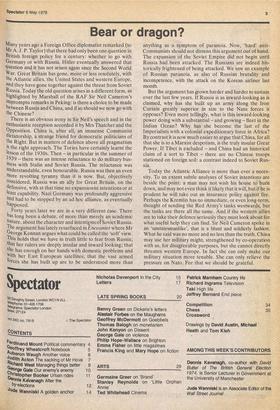Bear or dragon?
Many years ago a Foreign Office diplomatist remarked (to Mr A. J. P. Taylor) that there had only been one question in British foreign policy for a century: whether to go with Germany or with Russia. Hitler eventually answered that question and it has not arisen again since the Second World War. Great Britain has gone, more or less resolutely, with the Atlantic allies, the United States and western Europe, and they have gone together against the threat from Soviet Russia. Today the old question arises in a different form, as highlighted by Marshall of the RAF Sir Neil Cameron's impromptu remarks in Peking: is there a choice to be made between Russia and China, and if so should we now go with the Chinese?
There is an obvious irony in Sir Neil's speech and in the enthusiastic reception accorded it by Mrs Thatcher and the Opposition. China is, after all, an immense Communist dictatorship, a strange friend for democratic politicians of the Right. But in matters of defence above all pragmatism IS the right approach. The Tories have certainly learnt the lesson of the 1930s. Then — in particular in the summer of 1939 — there was an intense reluctance to do military business with Stalin and Soviet Russia. The reluctance was understandable, even honourable. Russia was then an even More revolting tyranny than it is now. But, objectively considered, Russia was an ally for Great Britain, on the defensive, with at that time no expansionist intentions or at least capability. Nazi Germany was profoundly aggressive and had to be stopped by an ad hoc alliance, as eventually happened.
Forty years later we are in a very different case. There has long been a debate, of more than merely an academic nature, about the character and intentions otSoviet Russia. The argument has lately resurfaced in Encounter where Mr George Kennan argues what could be called the 'soft' view. This holds that we have in truth little to fear from Russia; that her rulers are deeply insular and inward looking; that She has enough on her hands with domestic problems and With her East European satellites; that the vast armed forces she has built up are to be understood more than anything as a symptom of paranoia. Now, 'hard' antiCommunists should not dismiss this argument out of hand. The expansion of the Soviet Empire did not begin until Russia had been attacked. The Russians are indeed historically frightened of being attacked. We saw an example of Russian paranoia, as also of Russian brutality and incompetence, with the attack on the Korean airliner last month.
But the argument has grown harder and harder to sustain over the last few years. If Russia is as inward-looking as is claimed, why has she built up an army along the Iron Curtain greatly superior in size to the Nato forces it opposes? Even more tellingly, what is this inward-looking power doing with a substantial — and growing — fleet in the Indian Ocean? Why has she become the last of the Imperialists with a colonial expeditionary force in Africa? By contrast it is now much easier to argue that China, for all that she is to a Marxist despotism, is the truly insular Great Power. If Tibet is excluded — and China had an historical claim of a sort to Tibet — there are no Chinese troops stationed on foreign soil: a contrast indeed to Soviet Russia.
Today the Atlantic Alliance is more than ever a necessity. To an extent subtle analyses of Soviet intentions are beside the point: a man may not wish his house to burn down, and may not even think it likely that it will, but if he is prudent he will take out an insurance policy against fire. Perhaps the Kremlin has no immediate, or even long-term, thought of sending the Red Army's tanks westwards, but the tanks are there all the same. And if the western allies are to take their defence seriously they must look about for what useful help they can find. Sir Neil Cameron spoke in an `unstatesmanlike', that is a blunt and soldierly fashion. What he said was no more and no less than the truth. China may use her military might, strengthened by co-operation with us, for disagreeable purposes, but she cannot directly threaten western Europe. In fact she can only make our military situation more tenable. She can only relieve the pressure on Nato. For that we should be grateful.






































 Previous page
Previous page